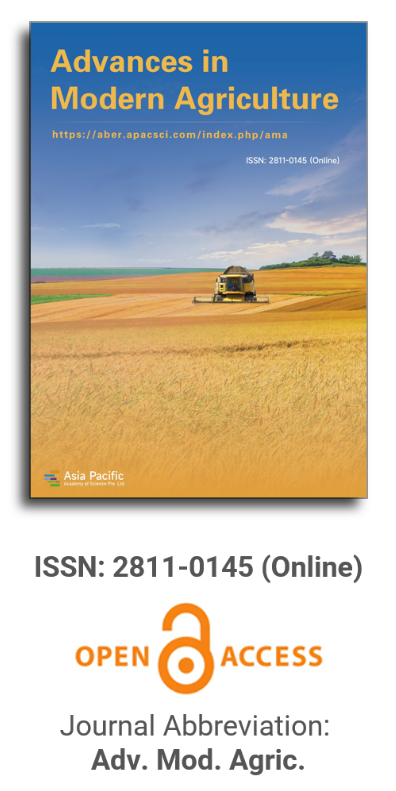


Genetically modified agriculture. A bioethical evaluation of a case from Colombian
Vol 4, Issue 1, 2023
VIEWS - 4212 (Abstract)
Download PDF
Abstract
Transgenic technology promises to eradicate hunger and poverty worldwide, among other sustainable development goals, and as a result, its acceptance is increasing. However, there are perspectives that highlight the challenges raised by such expansion. This paper is a reflection on a study effort on the bioethical consequences of using transgenic technology in agriculture in Colombia. The goal is to prove that this adoption poses a bioethical danger. The paper, on the one hand, addresses the problem that arises from confronting arguments for and against the adoption of this technology, while also noting the absolute importance of the economic aspect in the provision of genetically modified organisms (GMOs) and the general difficulties of Colombian national regulations regarding GMO control and surveillance. Finally, it discusses the bioethical implications of adoption, beginning with the illusion of a transformational technology and progressing via the political will of the government to its eventual delivery to consumers.
Keywords
References
- Rifkin J. The Century of Biotechnology: Genetic Trade and the Birth of a Brave New World (Spanish). Grupo Planeta (GBS); 1998.
- Chivian E, Bernstein A. Preserving Life: How Our Health Depends on Biodiversity (Spanish). Economic Culture Fund; 2015.
- Dyson T. World food trends and prospects to 2025. Proceedings of the National academy of Sciences 1999; 96(11): 5929–5936. doi: 10.1073/pnas.96.11.5929
- Agricultural Plant Biotechnology Association (Agro-Bio). The benefits of transgenic crops in Colombia (Spanish). Available online: http://www.agrobio.org/ambiente/los-beneficios-los-cultivos-transgenicos-colombia-2003-2015/ (accessed on 6 June 2017).
- Novas A. World Hunger and Genetically Modified Foods (Spanish). Cataract; 2005.
- Potter VR. Bioethics, the science of survival. Perspectives in Biology and Medicine 1970; 14(1): 127–153. doi: 10.1353/pbm.1970.0015
- ISAAA. 2014: Year in Review. ISAAA; 2014.
- Agricultural Plant Biotechnology Association (Agro-Bio). Transgenics in the world (Spanish). Available online: http://www.agrobio.org/transgenicos-en-el-mundo-colombia-region-andina/ (accessed on 6 June 2017).
- Colombian Agricultural Institute (ICA). Resolution 227 of 2012 (Spanish). Available online: http://www.ica.gov.co/Normatividad/Normas-Ica/Resoluciones-Oficinas-Nacionales/2012/2012R227.aspx (accessed on 29 April 2017).
- ETC Group. Our work and principles...of the ETC Group, or the Erosion, Technology and Concentration Action Group (Spanish). Available online: http://www.etcgroup.org/es/content/nuestro-trabajo-y-principios (accessed on 15 February 2018).
- Friends of the Earth International (FOEI). About us (Spanish). Available online: http://www.foei.org/es/sobre-nosotros (accessed on 6 June 2008).
- Monsanto. Benefits of FMOs. In plain speaking (Spanish). Available online: http://www.monsantoblog.es/beneficios-de-los-transgenicos/ (accessed on 22 February 2022).
- Friends of the Earth International (FOEI). Who benefits from transgenic crops? (Spanish). Available online: http://www.foei.org/wp-content/uploads/2014/04/25-foei-who-benefits-exec-summ-esp-mr.pdf (accessed on 1 September 2017).
- World Health Organization (WHO). Modern food biotechnology, health and human development: An evidence-based study (Spanish). Available online: http://www.who.int/foodsafety/publications/biotech/biotech_sp.pdf (accessed on 2 April 2016).
- Friends of the Earth International (FOEI). Fight against Monsanto (Spanish). Available online: http://www.foei.org/wp-content/uploads/2012/03/Lucha-contra-Monsanto.pdf (accessed on 5 May 2022).
- Mesa Cuadros G. Environmental Rights from a Comprehensive Perspective. Concepts and Foundations of New Demands and Current Resistance towards the “Environmental Rule of Law” (Spanish). National University of Colombia; 2008.
- Grupo Semillas. The transgenic corn that they want to introduce in Colombia (Spanish). Available online: http://www.semillas.org.co/es/revista/los-maces-transgnicos-que-se-quieren-introductor-en-colombia (accessed on 18 August 2022).
- Colombian Farmers Society (SAC). Import growth data, the highest in the last 9 years (Spanish). Available online: http://www.sac.org.co/es/sala-de-prensa/436-dato-de-crecimiento-de-importaciones-elmas-alto-de-los-ultimos -9-years.html?highlight=WyJpbXBvcnRhY2lvbmVzIl0 (accessed on 23 June 2017).
- Nemogá S, Gabriel R, Cortés A, et al. Biodiversity Valuation and Law: Theoretical and Practical Contributions to the Discussion in Colombia (Spanish). Universidad Nacional de Colombia; 2008.
- Riechmann J. Transgenics the Beam and Enves a Critical Perspective (Spanish). The Cataract Books; 2004.
- Sen A. The Idea of Justice (Spanish). Taurus; 2010.
Supporting Agencies
Copyright (c) 2023 José Edwin Cuéllar Saavedra
License URL: https://creativecommons.org/licenses/by/4.0/

This site is licensed under a Creative Commons Attribution 4.0 International License (CC BY 4.0).

Prof. Zhengjun Qiu
Zhejiang University, China

Cheng Sun
Academician of World Academy of Productivity Science; Executive Chairman, World Confederation of Productivity Science China Chapter, China
Indexing & Archiving
In the realm of modern agriculture, the integration of cutting-edge technologies is revolutionizing the way we approach sustainable farming practices. A recent study published in Advances in Modern Agriculture titled "Classification of cotton water stress using convolutional neural networks and UAV-based RGB imagery" has garnered significant attention for its innovative approach to precision irrigation management. Conducted by researchers from Institute of Data Science and the AgriLife Research and Extension Center of Texas A&M University (authors's information is below). This study introduces a novel method for classifying cotton water stress using unmanned aerial vehicles (UAVs) and convolutional neural networks (CNNs), offering a powerful solution for optimizing water use in agriculture.
Modern agricultural technology is evolving rapidly, with scientists collaborating with leading agricultural enterprises to develop intelligent management practices. These practices utilize advanced systems that provide tailored fertilization and treatment options for large-scale land management.
This journal values human initiative and intelligence, and the employment of AI technologies to write papers that replace the human mind is expressly prohibited. When there is a suspicious submission that uses AI tools to quickly piece together and generate research results, the editorial board of the journal will reject the article, and all journals under the publisher's umbrella will prohibit all authors from submitting their articles.
Readers and authors are asked to exercise caution and strictly adhere to the journal's policy regarding the usage of Artificial Intelligence Generated Content (AIGC) tools.
Asia Pacific Academy of Science Pte. Ltd. (APACSCI) specializes in international journal publishing. APACSCI adopts the open access publishing model and provides an important communication bridge for academic groups whose interest fields include engineering, technology, medicine, computer, mathematics, agriculture and forestry, and environment.



.jpg)
.jpg)

.jpg)
